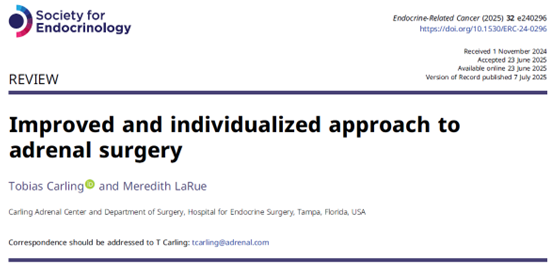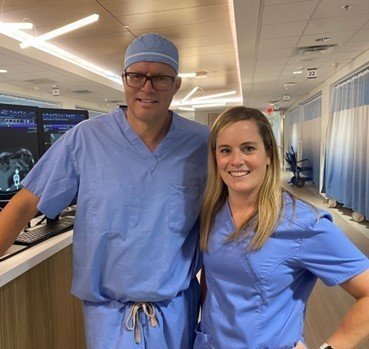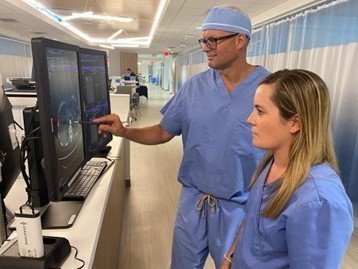Dr. Carling and APRN Meredith Publish Groundbreaking Article About Adrenal Surgery in World-Renowned Endocrinology Journal

Dr. Carling and APRN Meredith Publish Groundbreaking Article About Adrenal Surgery in World-Renowned Endocrinology Journal
In the world of endocrinology, few names shine as brightly as Dr. Tobias Carling, the world’s highest-volume adrenal surgeon, and his colleague, Meredith LaRue, APRN, at the Carling Adrenal Center in Tampa, FL. Their recent article in the prestigious Endocrine-Related Cancer journal (2025, July, see below) is making waves, offering a revolutionary perspective on adrenal surgery that could transform how we treat conditions like primary aldosteronism (PA), cortisol-producing lesions, pheochromocytomas, and adrenocortical carcinomas (ACC). This groundbreaking work, rooted in their unparalleled expertise and innovative approach, is not just a scientific milestone—it’s a beacon of hope for patients worldwide grappling with adrenal disorders.

The Adrenal Gland: A Tiny Powerhouse with Big Impact
Nestled atop our kidneys, the adrenal glands are small but mighty organs that produce hormones like aldosterone, cortisol, and adrenaline, which regulate blood pressure, metabolism, and stress responses. When these glands malfunction—whether due to benign tumors, cancerous growths, or overactive hormone production—the consequences can be severe, ranging from debilitating hypertension to life-threatening cancers. Dr. Carling and APRN Meredith, based at Carling Adrenal Center and Hospital for Endocrine Surgery, have dedicated their careers to tackling these challenges, performing more than 600 adrenal procedures per year.
Their latest publication, “Improved, Individualized Surgical Approach to Adrenal Disorders,” dives deep into tailoring surgical strategies to the unique biology and needs of each patient. This personalized approach, honed at one of the world’s busiest adrenal centers, leverages cutting-edge diagnostics and surgical techniques to maximize outcomes while minimizing risks. Let’s explore the key insights from their work and why it’s a game-changer.

Figure 1: Dr. Carling and APRN Meredith
Revolutionizing Primary Aldosteronism (PA) Treatment
Primary aldosteronism, or Conn’s syndrome, affects 5-10% of people with hypertension, making it a common yet often underdiagnosed condition. Caused by excessive aldosterone production, PA can lead to uncontrolled blood pressure and low potassium levels, increasing the risk of heart disease and stroke. The challenge lies in distinguishing unilateral PA (treatable with surgery) from bilateral PA (sometimes treated medically, but now also frequently with function-preserving adrenal surgery). Traditionally, adrenal vein sampling (AVS) is the gold standard for this distinction, but it’s invasive and fails in 5-20% of cases due to technical difficulties. AVS worldwide has become a bottleneck for patients to get to surgery and denies patients potentially curative adrenalectomy.
Dr. Carling and APRN Meredith propose a smarter, individualized approach. At the Carling Adrenal Center, they selectively use AVS based on patient factors like age, gender, imaging results, and biochemical markers. For instance, younger patients or women with clear unilateral tumors on CT scans—often linked to KCNJ5 gene mutations—may skip AVS and proceed directly to MBSA, the best minimally invasive adrenalectomy, which takes minutes instead of hours (as in surgery through the belly). This technique removes only the affected adrenal tissue, preserving healthy gland function and reducing the risk of adrenal insufficiency. For bilateral PA, they advocate staged partial (function-preserving) adrenalectomies, guided by post-surgical pathology and genetic testing, to balance cure rates with hormone preservation. Their data, drawn from 1,132 adrenalectomies between January 2022 and June 2024 (30 months), show that this approach minimizes unnecessary surgeries and improves outcomes, challenging the dogma of routine medical management for bilateral cases.
Tackling Cortisol-Producing Lesions
Cortisol-producing lesions, responsible for adrenal Cushing’s syndrome, range from benign adenomas to aggressive adrenocortical carcinomas (ACC). Subclinical Cushing’s syndrome, or mild autonomous cortisol secretion (MACS), is surprisingly common, accounting for 41% of the 1,132 adrenalectomies at Carling Adrenal Center over 30 months. Overt Cushing’s syndrome, marked by severe symptoms like weight gain and muscle weakness, is rarer but more urgent. Dr. Carling and APRN Meredith emphasize that adrenalectomy is the only cure for both, but the surgical approach must be tailored to the lesion’s nature—benign or malignant—and the patient’s clinical profile.
Their article highlights the genetic distinctions between MACS and overt Cushing’s, with PRKACA mutations driving severe cases. For MACS, they advocate partial adrenalectomy to preserve adrenal function, while ACC requires aggressive en bloc resection to prevent tumor spillage. Their innovative post-adrenalectomy cosyntropin stimulation test, performed at 04:00 to assess cortisol production, helps identify patients at risk of adrenal insufficiency, avoiding unnecessary glucocorticoid treatment. This precision approach, backed by their extensive surgical data, sets a new standard for managing cortisol-related adrenal disorders.
Simplifying Pheochromocytoma Surgery
Pheochromocytomas, tumors that produce excess adrenaline, can cause dangerous blood pressure spikes. Dr. Carling and APRN Meredith’s approach to these tumors is refreshingly straightforward. They advocate selective use of preoperative alpha-blockers, challenging traditional protocols, as modern MBSA techniques and expert anesthesia allow for rapid, safe surgeries, often completed in 20-30 minutes. In the 104 patients undergoing adrenalectomies for pheochromocytomas during a 30-month period (January 2022 to June 2024), they tailored procedures (e.g., tumor enucleation or partial adrenalectomy) to preserve adrenal function, especially in younger patients or those with bilateral tumors. For larger or malignant tumors (>8-19 cm), they used laparoscopic or open approaches, ensuring clean resection margins to prevent recurrence. Their data underscore the safety and efficacy of this individualized strategy, even for complex cases.
Confronting Adrenocortical Carcinoma and Metastases
Adrenocortical carcinomas (ACC), though rare (1.3% of Carling Adrenal Center cases), are aggressive and often present at advanced stages with tumors >8-12 cm in size. Dr. Carling and APRN Meredith stress that complete surgical resection (R0 resection) is the only chance for a cure, requiring meticulous technique to avoid tumor spillage. Their MBSA approach has proven effective for smaller, atypical ACCs diagnosed post-surgery, achieving clean margins without recurrence. For adrenal metastases, they apply similar principles, tailoring the approach (laparoscopic, hand-port-assisted, or open) to tumor size and invasion. Their 30-month data demonstrate that minimally invasive techniques, when feasible, reduce recovery time while maintaining oncologic outcomes.

Why This Matters
The work of Dr. Carling and APRN Meredith is a testament to the power of precision medicine. By integrating advanced diagnostics (like CT, AVS, and genetic testing) with tailored surgical techniques, they’ve created a blueprint for treating adrenal disorders that balances cure rates with quality of life. Their article challenges outdated one-size-fits-all protocols, showing that individualized care—guided by patient demographics, tumor biology, and surgical expertise—yields better results. At Carling Adrenal Center and Hospital for Endocrine Surgery, their high-volume practice (about 600 adrenalectomies per year) provides a unique dataset, making their findings robust and widely applicable.
Looking Ahead
This publication is more than a scientific paper—it’s a call to action for endocrinologists and surgeons worldwide. As Dr. Carling and APRN Meredith continue to push boundaries, they and their colleagues are building a high-quality research center focused on adrenal and other endocrine tumors. Their work underscores the importance of high-volume centers like Carling Adrenal Center, where expertise drives innovation. For patients with adrenal disorders, this means hope: better diagnoses, smarter surgeries, and improved lives. The endocrinology community is buzzing, and rightly so—Dr. Carling and APRN Meredith are rewriting the future of adrenal care.
Reference:
Carling T, LaRue M. Improved and individualized approach to adrenal surgery. Endocr Relat Cancer. 2025 Jul 7;32(7):e240296.
Additional Resources:
- Learn more about the Carling Adrenal Center
- Learn more about Dr. Tobias Carling
- Learn more about our sister surgeons at the Norman Parathyroid Center, and Clayman Thyroid Center.
- Learn more about the Hospital for Endocrine Surgery
